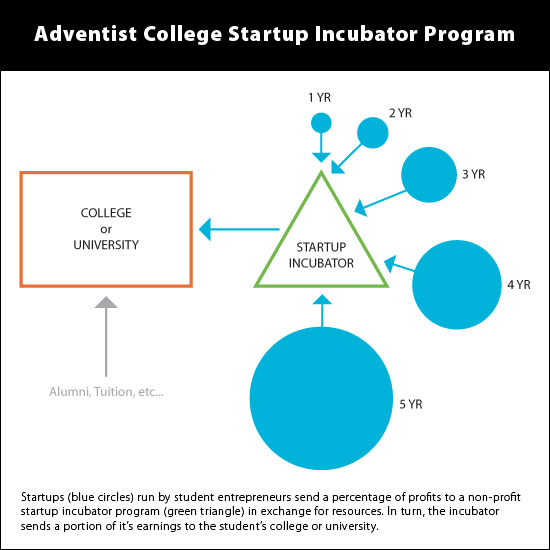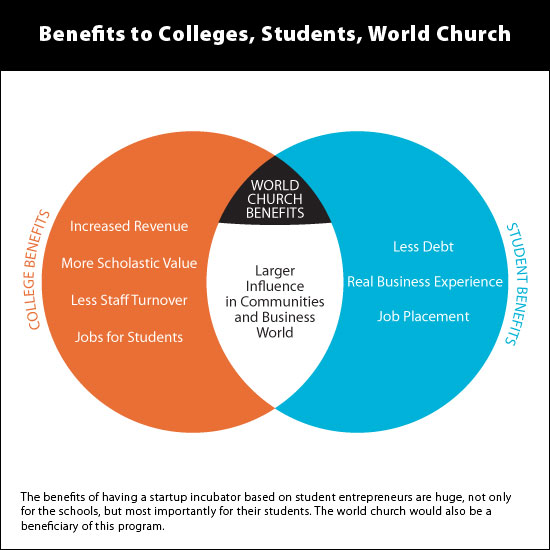If you enjoy following the world of technology startups as I do, you may have heard of a little outfit called Y Combinator (read this article from Inc. magazine for some additional insight into the company). Y Combinator is what is known as a startup incubator, which, according to Wikipedia, is “a program designed to accelerate the successful development of entrepreneurial companies through an array of business support resources and services, developed and orchestrated by incubator management and offered both in the incubator and through its network of contacts.” Y Combinator has produced a string of hit companies (all seeded by ridiculously small investments) such as Dropbox, Scridb, Reddit, Wufoo and Xobni among others.
I think that Adventist Colleges could benefit tremendously by having associated startup incubators that operate on a model similar to that of Y Combinator. How? If a college had a new revenue stream (other than getting money from students, both current and former) this would open up all kinds of potential benefits: lower tuition for students, decreased staff layoffs, campus enhancements, etc. Now, I’m no expert in how to run a college or university, so remember to take my ideas with a grain of salt, but I do believe the old saying, “where there’s a will there’s a way,” generally rings true.
What I am proposing is the creation of an organization, or organizations, (I think a private outfit could run leaner, quicker) that would support our colleges and universities and be operated in an autonomous fashion (separate from the colleges) by experienced business professionals.
So what got me thinking about this in the first place? Well, as anyone who knows me would say, I like to dream big ideas and think outside of the box. As I’ve been paying off my student loans month by month, I got to thinking that there has to be a better way of doing things. I think it’s unfortunate that our colleges have to charge students at all. It leads down a dark path–when will the cost of getting an education not be worth the debt? You see, if the goal of Adventist education is to make it available to anyone who wants it, the real issue should not be, in my opinion, getting enough students to support each school. The real issue is getting enough money to run a school so that it can be available to any academically-serious student who wishes to enroll. The difference in this kind of thinking is that it doesn’t assume that money only comes from students pockets (which for many students is money they never had in the first place).
Am I crazy to challenge the established line of thinking? Maybe, but I think dreaming big can only spawn more ideas, more thinking, more innovation.
Yes, I realize that schools aren’t supported solely by money from students. There are gifts from rich alumni, fundraisers and estate planning, but what if there was a source of cash that was more sustainable that our educational institutions could tap into? What if there was enough money in the pot that institutions could start offering cheaper and cheaper education? That’s what I’m driving at and I think it has some obvious and positive implications. Tell me, what serious high-school student wouldn’t work extra hard to earn a free-ride scholarship?
This all brings me back to creating an Adventist startup incubator. Imagine if there was an organization designed to harness the untapped entrepreneurial assets (ie – students) that are currently lying dormant in our colleges. We could nurture new ministries and organizations that yes, could bring in money for and add value to our colleges (not to mention the jobs that could be created for students after graduation). Here’s what it looks like as a diagram:
I wonder what kind of crazy ideas Adventist college students have up their sleeves that could be turned into great business opportunities? Maybe someone is dreaming up new medical technologies, consulting services, web businesses or architectural firms. The possibilities are literally endless. Sure, some of these businesses will fail, that’s part of business, and great real-world experience for students, but some of these businesses will undoubtedly succeed, and succeed big. Imagine if a student-run business went public and was able to generate millions of dollars that could be poured back into education.
How could this be put into practice? Let’s say students who have an idea come to a bi-weekly meeting where they can bounce their ideas off of their peers and get some advice from seasoned business leaders who can steer them in the right direction. The serious students can bootstrap their projects – or – in another scenario, the incubator program can pick the best ideas from each college to back with a $5,000 investment. That’s hardly anything – some of the churchs well-to-do business persons could easily facilitate this–no sweat. Why couldn’t small business classes offer real-world incentives for students developing business plans? I’d imagine that within 5 years of starting a program like this, there would be some real, tangible results.
Tell me what you think–is this a viable idea? Do you have some great ideas of your own? If nothing else, I hope to start the ball rolling and get people to ask, “Why do we do things the way we do? Is there a better way we could approach this?” In a worst-case scenario, our colleges could be forced to close up shop if students can’t afford to attend or don’t want to be saddled with debt. If we are faced with the option to change or die (even if it is sometime way off in the future), why not change?












